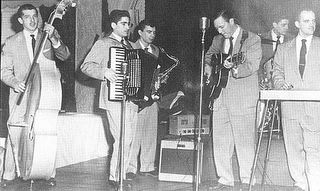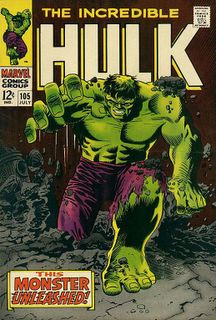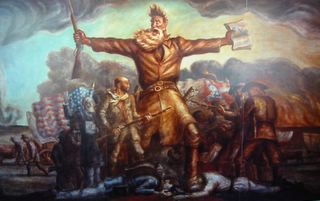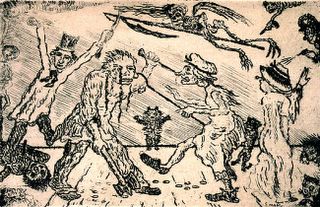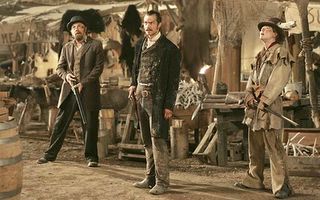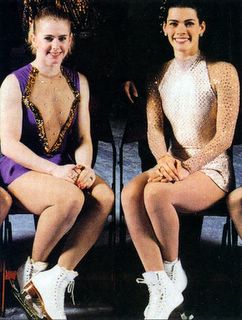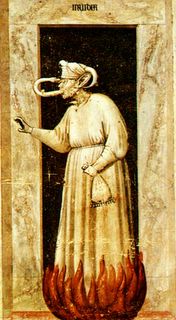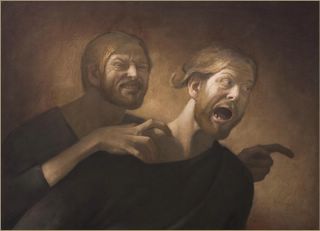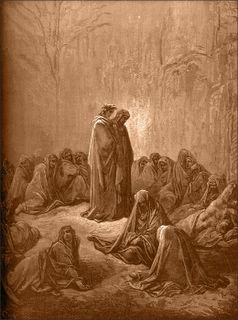7 Deadly Sins: Pride
 "All is not lost; the unconquerable Will.../That Glory never shall his wrath or might/Extort from me. To bow and sue for grace/With suppliant knee, and deify his power."Ringo Starr, I'm the Greatest.
"All is not lost; the unconquerable Will.../That Glory never shall his wrath or might/Extort from me. To bow and sue for grace/With suppliant knee, and deify his power."Ringo Starr, I'm the Greatest.
The Human Beinz, Nobody but Me.
Marvin Gaye, Ego Tripping Out.
Elton John, Ego.
Mose Allison, I'm the Wild Man.
Bob Dylan, Foot of Pride.
Muddy Waters, I Love the Life I Live (I Live the Life I Love).
Merle Haggard, I Take a Lot of Pride in What I Am.Pride is the prodigal sin. It began as the sin of sins, the foulest, the first, primal sin--that of Satan, of Adam and Eve, of Oedipus and Agamemnon. But today it has been domesticated; pride is encouraged in self-help manuals, serves as the rallying cry of various minorities, and is regarded as a common reservoir of good. "
I'm proud to be an American," begins the chorus of "God Bless the USA", a song that might one day become the new national anthem.
Pride has become our birthright, regardless of whichever wing of the country you are raised in. I was born in the early 1970s and went for a year to an "alternative" K-12 school: a large, cluttered house run by a group of hippies who may have been intermarried or related--I never found out. You were free to wander from room to room, absorbing whatever was being taught--so in the course of a year I finger-painted, attempted fractions and decimals before I grasped the concept of adding (something that likely contributed to my abysmal math skills), listened to one of the hippies pick out songs from "Free to Be You and Me" on guitar. The governing mantras of the school were "
I'm proud of you!" and "
You should be proud of yourself!"--bestowed upon any remote achievement by a child.
Pride has become so enculturated that I imagine some would be surprised it was ever once considered blasphemous. You can find the gilt of pride anywhere that you look--military recruitment ads ("Be all you can be" or "The Few, The Proud, The Marines"); "
Don't dream it--be it!", from the
Rocky Horror Picture Show; "
Keep reaching for the stars," Casey Kasem's old sign-off phrase; every sports team's boast of being number one. Etc., etc.

"
I was in the greatest show on earth/for what it was worth." So goes Ringo Starr's boast, written by John Lennon; the song's lofty claims are undercut by the fact that Ringo was always the humblest of the Beatles, the one who knew the extent of his good fortune and kept his sense of humor. On 1973's
Ringo, my candidate for the best solo Beatles album, a sort of secret Beatles reunion.
Or take the dancing braggart of the Human Beinz's "Nobody But Me", from 1967, whose pride would shatter if it turned out that you could do the boogaloo better than him. (On
Nuggets.)
Rising in rankThe sin of pride, at its core, is not knowing, or not accepting, your place in the scheme of things. First Satan, then man, challenged God in His supremacy--the result always ends in a fall. Man is denied access to certain knowledge ("
for my thoughts are not your thoughts, and your ways are not my ways" Isaiah 55:8), and if he keeps pushing for it, disaster always follows. It's a fate that transcends religions and time, from
Prometheus, chained to a rock and his innards gnawed by eagles for giving man the gifts of fire and art, to
Icarus, tumbling ablaze into the sea, to Shelley's
Ozymandias, whose arrogant visage lies in ruins in the desert wastes.
Or
Dr. Faustus, the Renaissance's favorite prideful sinner, who sells his soul in exchange for knowledge. Christopher Marlowe's Faustus meets
Pride, in the course of being introduced to the sins: Pride comes first among the seven, naturally. "
I am Pride. I disdain to have any parents. I am like to Ovid's flea; I can creep into every corner of a wench." After a bit, Pride no longer deigns to speak, "
unless the ground be perfumed, and covered with cloth of arras."

"
Pride isolates and alienates from both God and society; it is a form of self-satisified and self-sufficient withdrawal," (Henry Fairlie). Pope Gregory the Great assigned pride the top rank of the seven--for Gregory, pride was the well from which all other sins were drawn, the alpha of damnation. (It also made political sense, as the medieval church found pride all too evident in the kings and nobles with which it constantly was battling for power.)
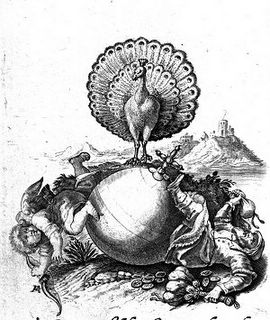
Pride is also exaggerated self-worth, vanity, egoism without check, the self prized above all others. For the proud person, according to some wonderful lines from Spinoza, "
the things he has done himself, even when they are mistaken, alone please him...he favors himself in his thought; and when he think he surpasses others in all things, he walks with himself along the broad spaces of his own thoughts and silently utters his own phrases." As punishment, in Dante's
Purgatorio, the proud are forced to bear enormous rocks on their backs.
The greatest flowering of pure egoism since the court of Louis XIV occurred in the 1970s. By 1974--the year the first issue of
People came out--modern celebrity, crowned with obscene wealth and numbed by copious drug use, had created a strain of pride so virulent that it often destroyed its hosts.
The most brutally honest products of this period didn't find many listeners (and those that did become hits, like Joe Walsh's "Life's Been Good", played it for laughs). Marvin Gaye's "Ego Tripping Out", a muddy, slurred lament to having lost all sense of scope, was released in 1979. It was meant to be the leadoff single to Gaye's
Lover Man, but it flopped so hard that the album was never released. On
The Very Best.

And Elton John's "Ego", another failed single (from 1978), features grasping celebrity vanity at its most naked. (For much more on "Ego", read
Paul Shrug's wonderful
post on this song). Bernie Taupin's lyrics are oddly straightforward for much of it, and John sings the hell out of them. (That said, "
foolish/before-schoolish/amateurish/lose-your-cool-ish" is possibly the worst rhyming in the history of the English language.) The only way to get "Ego" officially is to buy the terrible album
A Single Man.
Yes, master
Sometimes a pure egoist is wonderful to watch, especially one with a sense of his own ridiculousness. Take Reggie Jackson: "
I represent both the underdog and the overdog in our society"; "
I have to deal with the magnitude of me";
"I didn't come to New York to be a star, I brought my star with me.; "
I'm the straw that stirs the drink". His teammate, Catfish Hunter, responded with some quips of his own: "
[Reggie] would give you the shirt off his back. Of course he'd call a press conference to announce it." "
When you unwrap a Reggie bar, it tells you how good it is."
Or take Mose Allison's wild man, who ate breakfast with a tiger and danced with Satan's grandmother. From 1964. (On the collection
Allison Wonderland.)
It's all well until someone else's pride runs headlong into yours. From Austen's
Pride and Prejudice:
"His pride does not offend me so much as pride often does, because there is an excuse for it. One cannot wonder that so very fine a young man, with family, fortune, every thing in his favour, should think highly of himself. If I may so express it, he has a right to be proud.""That is very true," replied Elizabeth, "and I could easily forgive his pride, if he had not mortified mine."National pride
Can patriotism be considered a sin? Are the people who chant "USA! USA!", as if the country were a top-ranked college football team, violating a core tenet of Western civilization?
The need to reclaim national pride after the Vietnam debacle became an obsession (for some) for 15 long years, until the luster allegedly was restored with the First Gulf War. Perhaps it was true. “
Every troop I encountered during the Gulf War swelled with pride knowing about the support they had in the U.S...Vietnam vets [in Desert Storm] wept," one veteran said.
But even George Will, at the time of the First Gulf War, saw something troubling in the spectacle. "
A peculiar kind of patriot says that by this war America "will get its pride back"...since when has American pride derived primarily from military episodes? A nation that constantly worries about its pride should worry. It is apt to confect military occasions for bucking itself up, using foreign policy for psychotherapy."
However, the American need to build up pride via fighting has had a long pedigree, especially the Scots/Irish who emigrated in the 18th and 19th centuries, and who populated Appalachia, the lower South and Texas.
David Hackett Fischer: "
The rearing of male children in the back settlements was to foster fierce pride, stubborn independence and a warrior's courage in the young. An unintended effect was to creat a society of autonomous individuals who were unable to endure external control and incapable of restraining their rage against anyone who stood in their way." Their most notable representatives, in the years to come, would be Andrew Jackson, Davy Crockett, Sgt. York and George Patton, none strangers to pride.
Or as one backcountry man once said, "
Lord, grant that I may always be right, for thou knowest I am hard to turn."
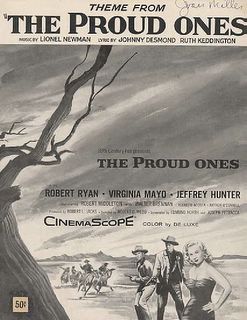
In 1983, Bob Dylan recorded a jeremiad called "
Foot of Pride." In it, Dylan wanders a blasted landscape plagued by the proud and the damned, the walking dead, half-men, Philistines, concert promoters--a world Dylan and Larry Charles attempted to recreate two decades later in the bizarre film
Masked and Anonymous. (The phrase "foot of pride" comes from Psalms 36:11 ("
let not the foot of pride come against me, and let not the hand of the wicked remove me."))
A character who would prosper in such a world is Cormac McCarthy's Judge Holden, in
Blood Meridian, a soulless, brilliant murderer who believes war is the ultimate human achievement--the test of will against will. "
Wolves cull themselves, man. What other creature could? And is the race of man not more predacious yet?...[Man's] meridian is at once his darkening and the evening of his day. He loves games? Let him play for stakes."
(After recording this and its sister masterpiece "Blind Willie McTell" for 1983's
Infidels, Dylan replaced them at the last minute with vastly inferior songs, hobbling the album. "Foot of Pride" was finally released a decade later on the
Bootleg Series Vol. 1-3.)
Keeping prideBut let's not go out so apocalyptically. Pride's current place as a societal good has been a benefit for a great many people--especially for those who society has long taught to feel inferior. The history of African-American music in the 20th Century, in a way, is an establishment of and a joy in racial pride, from Ellington's "Black Beauty" to James Brown's "Say It Loud (I'm Black and I'm Proud)". Or Muddy Waters, who loves the life he leads, and makes no bones about it. (From 1956; you can find it on
Anthology.)
The emperor
Marcus Aurelius said, "
This may help keep you from vainglory...If you have truly seen what the facts are, never mind what others think of you, and be content to live the rest of your life as nature wills." Or listen to Merle Haggard, who shares the same sentiments. "I Take a Lot of Pride In What I Am" is one of my favorite songs ever, sung with amazing dignity and power by Haggard (from 1968, found on
Capitol Collectors Series.)
End creditsAdios, sins. I am indebted to (aka I ransacked for good bits) the following: Fairlie's the
Seven Deadly Sins Today; Solomon Schimmel's
The Seven Deadly Sins; and the collection
Wicked Pleasures (esp. James Ogilvy's essay on greed, and Wm. Gass' on lust). The recent series of mini-books on the Sins is hit or miss--
Pride isn't published yet, Wendy Wasserstein's
Sloth is close to unreadable, an awful elephantine failed joke, and Robert Thurman's
Anger starts well but ends as a sort of bikram yoga manual. The rest range from good (Joseph Epstein's
Envy, Phyllis Tickle's
Greed) to excellent (Francine Prose's
Gluttony) to brilliant (Simon Blackburn's
Lust.)
....and on the seventh sin, I rest. On vacation for a while. Enjoy yourselves. Please visit the blogs in the links column, all highly recommended.


